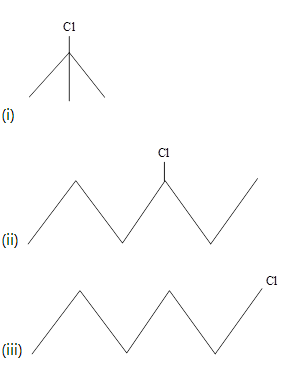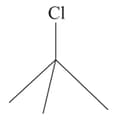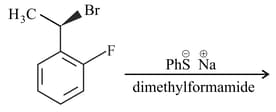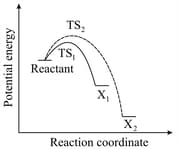Chemical Reactions of Haloalkanes
Chemical Reactions of Haloalkanes: Overview
This topic covers concepts such as Chemical Reactions of Haloalkanes, Nucleophilic Substitution Reactions of Alkyl Halides, Reaction of Haloalkanes with Aqueous NaOH /Aqueous NaOH, Williamson's Synthesis for Ethers, Saytzeff's Rule, etc.
Important Questions on Chemical Reactions of Haloalkanes
and reactions differ from each other because of
Identify A, B, C and D in the following process :
(i)
(ii)
What is the order of reactivity of following compounds towards substitutions reaction.
(i) 
(ii) 
(iii) 
What is the order of reactivity of following compounds towards substitution reaction.

Which one of the following two substances undergoes reaction faster?
(i)  or (ii)
or (ii) 
An SN2 reaction at an asymmetric carbon of a compound always gives:
A solution of (+) -2-chloro-2-phenylethane in toluene racemises slowly in the presence of small amount of , due to the formation of –
A solution of (+) -2-chloro-1-phenylethane in toluene racemises slowly in the presence of small amount of , due to the formation of:
1–chlorobutane on reaction with alcoholic potash gives –
n–Propyl bromide on treatment with ethanolic potassium hydroxide produces –
n–propyl bromide on treatment with ethanolic potassium hydroxide produces
The major product of the following reaction is

The product of following reaction is –
In the reaction,
The product C is.
Treatment of with sodium ethoxide in ethanol at gives a mixture of two products and through one step processes. The energy profile diagrams of the two processes are shown below.

An alkyl halide with -hydrogen atom, when treated with a nucleophile/base, undergoes a substitution reaction or an climination reaction, depending on the strength and size of the nucleophile base and the reaction conditions.

For the above reaction, the correct statement(s) is(are):
The correct order for the hydrolysis in aqueous ethanol is
In the following question a statement of assertion followed by a statement of reason is given. Choose the correct answer out of the following choices.
Assertion: reacts with methyl chloride to give methyl isocyanide.
Reason: is an ambident nucleophile.
Saytzeff's rule states that _____ product is the major product in dehydrohalogenation of an alkyl halide.
Which of the following best describes Saytzeff's rule?
